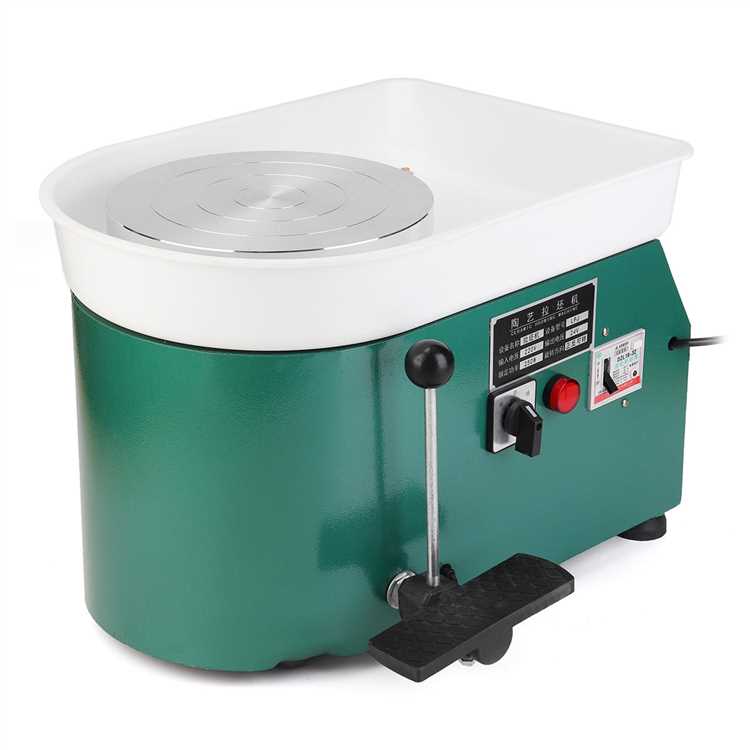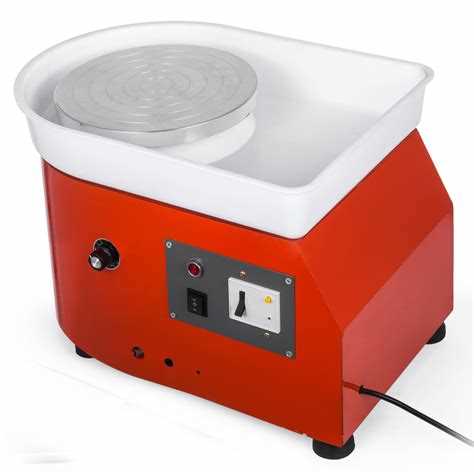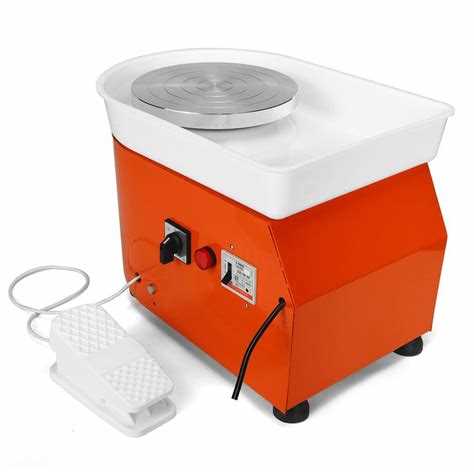Have you ever wondered how much a pottery machine costs? Whether you are a professional potter or someone looking to start a new hobby, knowing the prices of pottery machines can help you make informed decisions about your purchase. In this article, we will explore the different factors that influence the price of pottery machines and provide you with a general idea of how much you can expect to spend.
Firstly, it’s important to understand that pottery machines come in a variety of types and sizes, each serving a different purpose. The most common types of pottery machines include pottery wheels, kilns, and slab rollers. Pottery wheels are used for shaping clay on a rotating wheel, whereas kilns are used for firing the clay at high temperatures to create finished ceramics. Slab rollers, on the other hand, are used to flatten clay into even sheets for hand-building pottery.
The prices of pottery machines can vary greatly depending on the type and size of the machine. For example, a basic pottery wheel for beginners can cost around $200, while a professional-grade wheel with advanced features can cost upwards of $1000. Kilns, on the other hand, can range from a few hundred dollars for small tabletop models to several thousand dollars for larger, industrial-size kilns. Similarly, slab rollers can range from around $300 for a small tabletop model to over $2000 for a larger floor-standing model.
Other factors that can influence the price of pottery machines include the brand, quality, and additional features. Well-known brands and machines made from high-quality materials are generally more expensive but can provide better performance and durability. Additionally, machines with advanced features such as adjustable speeds, digital controls, and built-in safety features tend to have higher price tags. It’s important to carefully consider your needs and budget when choosing a pottery machine to ensure that you are getting the best value for your money.
Understanding Pottery Machines
Pottery machines are essential tools for artists and craftsmen who work with clay. These machines help in shaping the clay and creating various pottery items such as vases, bowls, and sculptures. Understanding the different types and features of pottery machines can help artists make an informed decision when purchasing one.
Types of Pottery Machines:
- Electric Pottery Wheels: These machines are commonly used by potters and allow for precise control over the speed and direction of the wheel. They are ideal for creating symmetrical pottery pieces.
- Manual Pottery Wheels: These machines require the artist to use their own strength to spin the wheel. They are suitable for artists who prefer a more hands-on approach and do not mind putting in physical effort.
- Slab Rollers: These machines help in creating flat slabs of clay, which can be used for constructing various pottery pieces. They are useful for artists who work with hand-building techniques.
- Extruders: These machines are used for creating uniform and consistent shapes of clay by extruding it through a die. They are commonly used for creating handles, coils, and other intricate details.
Features to Consider:
- Speed Control: Look for pottery machines that offer variable speed control, allowing you to adjust the speed according to your needs.
- Motor Power: Consider the power of the motor, which determines the machine’s ability to handle heavier loads of clay.
- Stability: Ensure that the machine is stable and secure when in use, to prevent any accidents or mishaps.
- Noise Level: Some pottery machines can be quite noisy, so consider the noise level if it is a factor that may affect your work environment.
- Size and Portability: Depending on your workspace and transportation needs, consider the size and portability of the machine.
Price Range:
The prices of pottery machines can vary greatly depending on the type, size, and features of the machine. Manual pottery wheels are generally more affordable, with prices ranging from $100 to $500. Electric pottery wheels tend to be more expensive, with prices ranging from $500 to $2000 or more. Slab rollers and extruders are also available within a similar price range as electric pottery wheels.
Conclusion:
When choosing a pottery machine, it is important to consider your specific needs, preferences, and budget. Understanding the different types and features of pottery machines can help you find the right machine that suits your artistic style and requirements.
Types of Pottery Machines
There are several types of pottery machines available, each with its own features and capabilities. Here are some of the most common types:
- Kick Wheel: A traditional type of pottery wheel that is operated by foot. The potter uses a kicking motion to rotate the wheel, allowing them to shape the clay.
- Electric Wheel: This type of pottery wheel is powered by electricity. It offers more consistent and controlled spinning, making it easier for potters to create precise shapes.
- Potters Wheel with a Foot Pedal: Similar to an electric wheel, but with the added control of a foot pedal. Potters can adjust the speed of the wheel using the pedal, allowing for more precise control.
- Slab Roller: Used for creating flat slabs of clay, a slab roller consists of two parallel rollers that press the clay into a flat shape. This can be used for making tiles, plates, and other flat pottery forms.
- Extruder: An extruder is a machine that pushes clay through a shaped opening to create long coils or tubes of clay. This is commonly used for creating handles, spouts, and other intricate shapes.
These are just a few examples of the types of pottery machines available. Each machine has its own unique advantages and is suited for different pottery techniques. When choosing a pottery machine, it is important to consider your specific needs and preferences as a potter.
Factors Affecting Pottery Machine Prices
There are several factors that can influence the price of a pottery machine. These factors can vary depending on the type and quality of the machine, as well as the specific features and functionality it offers. Some of the main factors affecting the prices of pottery machines are:
- Type of Machine: The type of pottery machine you choose can greatly impact its price. There are different types of machines available, such as electric pottery wheels, kick wheels, and hydraulic machines. Each type has its own advantages and disadvantages, which can affect the pricing.
- Size and Capacity: The size and capacity of a pottery machine can also affect its price. Larger machines with higher capacities tend to be more expensive than smaller ones, as they can handle larger projects and require more material.
- Motor Power: The power of the motor used in a pottery machine can impact its price. Machines with more powerful motors tend to be more expensive, as they can handle heavier materials and provide smoother operation.
- Brand: The brand of a pottery machine can also impact its price. Well-known and reputable brands often have higher prices due to their established reputation and quality.
- Features and Accessories: The features and accessories included with a pottery machine can affect its price. Machines with advanced features, such as programmable settings or built-in clay recycling systems, tend to be more expensive. Additionally, machines that come with additional accessories, such as adjustable stools or tool kits, may have higher prices.
- Quality and Durability: The overall quality and durability of a pottery machine can influence its price. Machines made from high-quality materials and designed for long-lasting use may have higher price tags.
- Market Demand: Market demand can also impact the prices of pottery machines. If a particular type or brand of machine is in high demand, it may result in higher prices due to limited availability.
| Factor | Impact on Price |
|---|---|
| Type of Machine | Variable |
| Size and Capacity | Higher capacity = higher price |
| Motor Power | More power = higher price |
| Brand | Reputable brand = higher price |
| Features and Accessories | Advanced features or additional accessories = higher price |
| Quality and Durability | Higher quality = higher price |
| Market Demand | High demand = higher price |
It is important to consider these factors when looking for a pottery machine to ensure that you choose a machine that meets your needs and budget. By understanding these factors, you can make a more informed decision and find a pottery machine that is both affordable and suitable for your pottery projects.
Average Cost of Pottery Machines
Pottery machines can greatly vary in price depending on their size, type, and features. Here is an overview of the average cost of different types of pottery machines:
Kick Wheels
Kick wheels, which are operated manually using a foot pedal, are the most basic and affordable type of pottery wheel. On average, a kick wheel can cost between $200 and $500.
Electric Wheels
Electric wheels, which are powered by electricity and offer more control and speed, are more expensive than kick wheels. The average cost of an electric pottery wheel is between $500 and $2000.
Tabletop Wheels
Tabletop wheels, also known as mini wheels, are smaller and more portable versions of electric wheels. They are ideal for small-scale projects and beginners. The average cost of a tabletop pottery wheel is between $200 and $800.
Pottery Presses
Pottery presses are machines that help in creating consistent pottery shapes and forms. They can be either manual or powered by electricity. The average cost of a pottery press depends on its size and features and ranges from $500 to $5000.
Clay Mixers
Clay mixers are used to mix clay and other materials to achieve the desired consistency. They can be either manual or electric. The average cost of a clay mixer ranges from $500 to $3000, depending on its size and capacity.
Kilns
Kilns are essential for firing and glazing pottery. They come in various sizes and types, such as electric, gas, and wood-fired kilns. The average cost of a kiln can range from $500 to $5000, depending on its size and type.
It’s important to note that these are just average price ranges, and the actual cost of pottery machines can vary significantly depending on factors such as brand, quality, and additional features. It’s always recommended to do thorough research and compare prices before making a purchase.
High-End Pottery Machines: Are They Worth the Price?
Pottery machines come in a wide range of prices, from budget-friendly options to high-end models that can be quite expensive. While it may be tempting to go for a more affordable machine, there are several reasons why investing in a high-end pottery machine can be worth the price.
1. Durability and Quality:
A high-end pottery machine is built to last. These machines are often made with top-quality materials and are designed to withstand constant use and heavy workloads. This means that you won’t have to worry about your machine breaking down or wearing out quickly, saving you money in the long run.
2. Enhanced Performance:
High-end pottery machines are often equipped with advanced features and technologies that can greatly enhance your pottery-making experience. These machines may offer precise speed control, ergonomic designs, and automatic functions that can help streamline your workflow and improve the quality of your work.
3. Versatility:
High-end pottery machines often come with a wide range of attachments and accessories that allow you to explore various pottery techniques and create different types of pottery. These machines may have multiple speed settings, interchangeable heads, and adjustable features that give you greater flexibility and creative possibilities.
4. Precision and Consistency:
High-end pottery machines are known for their precision and consistency. These machines are designed to deliver accurate results, allowing you to create pottery pieces with consistent shapes, sizes, and thicknesses. This can be particularly important for professional potters who need to meet specific standards or create custom orders.
5. Support and Warranty:
When you invest in a high-end pottery machine, you often receive excellent customer support and a comprehensive warranty. This means that if you encounter any issues or need assistance, you can rely on the manufacturer to provide you with timely help or even repair or replace your machine if necessary. In contrast, budget-friendly machines may not offer the same level of support or warranty coverage.
Conclusion:
While high-end pottery machines might come with a higher price tag, they often offer durability, enhanced performance, versatility, precision, and reliable support that can justify the investment. Before making a decision, consider your pottery-making needs and budget, and weigh the benefits of a high-end machine against your requirements.
Budget-Friendly Pottery Machines: Affordable Options
If you are interested in pottery but are on a budget, there are still plenty of affordable options available for purchasing pottery machines. While some may assume that pottery machines are only available at high prices, there are actually a variety of models and brands that offer budget-friendly options for beginners or those looking to save some money.
When searching for a budget-friendly pottery machine, it is important to consider your specific needs and requirements. Here are some affordable options to consider:
- Shimpo Aspire – The Shimpo Aspire is a compact and lightweight pottery wheel that is perfect for beginners or those with limited space. It offers a smooth and quiet operation, making it a great option for practicing basic pottery skills.
- Speedball Artista – The Speedball Artista pottery wheel is another affordable option that offers durability and a user-friendly design. It is equipped with a powerful motor and adjustable speed control, allowing for precise control over the wheel’s rotation.
- Amaco Shimpo RK-55 – The Amaco Shimpo RK-55 is a slightly higher-priced option but still falls within the budget-friendly category. It is known for its sturdy construction and reliable performance, making it suitable for both beginners and intermediate potters.
- US Art Supply Clearwater Studio Set – If you are looking for a complete pottery set, the US Art Supply Clearwater Studio Set is a great option. It includes a pottery wheel, kiln, and a variety of pottery tools, making it a cost-effective choice for those who want to start pottery from scratch.
- Used Pottery Machines – Another way to find budget-friendly pottery machines is by looking for used ones. Many potters sell their old machines when upgrading to newer models, allowing you to find quality machines at a lower price.
Before making a purchase, it is recommended to research different brands, read reviews, and compare prices to find the best budget-friendly pottery machine for your needs. By doing so, you can find a machine that fits your budget without compromising on quality.
FAQ:
What is a pottery machine?
A pottery machine is a specialized tool used by potters to create pottery. It helps in shaping, trimming, and decorating clay to make various pottery items.
How much does a pottery machine cost?
The cost of a pottery machine can vary depending on its size and features. On average, a basic pottery machine can cost around $500, while more advanced models can range from $1000 to $5000.
Are pottery machines easy to use?
Yes, pottery machines are designed to be user-friendly. They come with easy-to-understand instructions and can be operated by potters of all skill levels, from beginners to professionals.
Can I purchase a used pottery machine?
Yes, you can find used pottery machines for sale. Buying a used machine can be a more affordable option, but it’s important to thoroughly inspect it and test its functionality before making a purchase.


